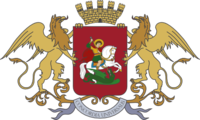Nation/Carchesia
| This page is a work in progress by its author(s) and should not be considered final. |
| Most Serene Carchesian Republic | ||||||
|---|---|---|---|---|---|---|
|
||||||
| Motto: "Concordia Universalis" (Latin: "Universal Harmony") |
||||||
| Anthem: Hinn da Vixoria (Carchesian: "Hymn of Victory") |
||||||
Location of Carchesia in Atlantian Oceania
|
||||||
| Region | Atlantian Oceania | |||||
| Capital | Christiania | |||||
| Largest city | Carthage | |||||
| Official languages | Carchesian | |||||
| Recognised regional languages | ||||||
| Demonym | Carchesian | |||||
| Government | Unitary parliamentary republic (de jure) Federal parliamentary elective monarchy (de facto) |
|||||
| - | Captain Regent | Anna-Sofïa Caixebrâncos | ||||
| - | President of the Generalitat | Marin Petri | ||||
| Legislature | Assemblies of the Republic | |||||
| - | Upper house | Senate of the Republic | ||||
| - | Lower house | Assembly of the People | ||||
| Currency | Peseta (SRP) |
|||||
| Time zone | CST (UTC±?) | |||||
| DST not observed | ||||||
| Date format | dd-mm-yyyy | |||||
| Drives on the | left | |||||
| Calling code | +13 | |||||
| Internet TLD | .sr | |||||
Carchesia (/kɑːrˈkiːʒə/; Carchesian: Carchexa, /karˈkeʃa/), officially the Most Serene Carchesian Republic (Carchesian: Sèreníssima Reppública Carchesiana, pronounced /saɾeˈnisima ɾeˈpyvliɡa karkeˈʃana/), is a sovereign state consisting of the ???.
Modern Carchesia operates as a consensual and consociational democracy with a de facto federal structure under the state of autonomies. The Carchesian economy is generally described as a social market, with an entrenched tradition of tripartism and a policy known as the merchant state.
Etymology
History
The ancient cities
Rise and fall of empire
Medieval states
Resurgence
Civil war and the Silent Revolution
Modern history
Geography
Climate
Administrative subdivisions
Carchesia is subdivided into twenty-eight autonomies and seventy-five circumscriptions, which are variously described as departments, prefectures or metropolises. All circumscriptions, regardless of designation, are subdivided into municipalities, which themselves can be variously described as cantons, villages, cities or liberties.
| Senate of the Republic | |
|---|---|
|
|
| Assembly of the People | |
|
|
Politics
Carchesia is organised as a democratic, parliamentary republic with universal suffrage. The state operates under an uncodified constitution spread across several Basic Laws and Statutes of Autonomy; the conventions of legislative supremacy form the de facto highest principles of Carchesian constitutional law, namely that the Assemblies of the Republic can make any law on any subject, no valid Act of the Generalitat can be questioned by the courts and no Assembly can pass a law that cannot be amended or repealed by future Assemblies.
The Captain Regent, currently Anna-Sofïa Caixebrâncos, is the head of state and commander-in-chief of the Carchesian Republican Armed Forces and is elected to a single, non-renewable term of six years by the Grand and General Assembly, an electoral college consisting of all members of the Assemblies of the Republic plus an equal number of delegates nominated by the autonomous assemblies. The Captain Regent acts as a largely ceremonial head of state, with the President, currently Marin Petri, acting as head of government, leader of the Government of the Generalitat and chief executive of the state. While the choice of a President is legally the sole prerogative of the Captain Regent, the appointed President must be confirmed by and able to command the confidence of the Assembly of the People, forcing the Captain Regent to choose a President acceptable to the political alliance in control of the legislature.
The Assemblies of the Republic form the bicameral legislature of the Most Serene Republic. The Assemblies enjoy legislative supremacy and can pass any law they wishes by a concurrent majority. The Assemblies also have the power to supervise government activities through its committees, remove the Government from office and elect the Public Defender. The Assembly of the People is the lower and more powerful of the two chambers. The Assembly consists of 500 delegates directly-elected by party-list proportional representation to terms of up to four years and has the sole power to invest and dismiss the Government. The Assembly is the body from which most legislation originates and possesses the power of the purse and the right to declare war and peace on behalf of the Republic.
The Senate is the upper house of the Assemblies and a largely corporative body, representing the interests of various sectors of society, as well as high clergy, prominent political families and top members of the judiciary. The Senate has the power to delay legislation, but lacks veto power; decisions and amendments made by the Senate can be overturned by an absolute majority of the Assembly of the People. The Senate’s status as a non-partisan body and its insulation from public opinion gives it the power to act as a chamber of sober second thought and gives the body a more collegial atmosphere than its elected counterpart; as the Government does not need to rely on the support of the Senate to remain in office and cannot rely on its automatic support, the Government commonly faces more serious scrutiny in the upper house than the lower.
Law and judiciary
Carchesia is governed by Carchesian law, a civil law system. Law in Carchesia is meant to be comprehensive, well-organised, easily accessible and adaptable and is set down through legislative law rather than judicial decisions; the law system in general proceeds from abstractions, formulates general principles and distinguishes substantive rules from procedural ones. Trials use the inquisitorial approach, with almost all criminal cases (except petty offences and those before juvenile and terrorism courts) tried by a panel professional and lay judges. The Criminal Code of Carchesia forms the basis of criminal law and select academic writings are considered a formal source of law in Carchesia, resolving disputes where no other body of law can make decisions.
Carchesian law distinguishes between private law and public law, the former of which governs the actions of individuals, both as they relate to each other and society at-large, and the latter of which governs the relationship between the state and individuals or society as a whole. Courts in Carchesia is separated into four separate "streams": penal, martial, civil and administrative.
In the civilian penal stream, Courts of First Instance hear trials for contraventions and grant indictments for delicts and crimes, which are then tried in the Trials Division of the Courts of Assize. Appeals are heard in the Assize’s Appeals Division. There are one or more Courts of First Instance for each circumscription, while each autonomy has a single Court of Assize. Cases involving minors are tried before a Juvenile Court, while those involving suspected terrorists are tried before the Standing Terrorism Court; personnel of the Carchesian Republican Armed Forces are tried before a Military Court at first instance and may appeal to the Court of Military Appeals.
Most civil cases are first heard in the Courts of First Instance; however, cases involving disputes over labour law are heard in the Labour Court, cases involving disputes over international trade, customs and intellectual property disputes are heard in the International Trade Court and cases in which the Generalitat of Carchesia is a party are heard in the Court of Claims. All appeals are made to the Court of Public Appeals.
Administrative law is handled separately from penal and civil law, with more specialised courts for several subject matters. Family law, immigration law and tax law all have specialist courts dedicated to resolving matters in said areas, while cases involving other areas of administrative law are heard before the General Administrative Court. In addition, the Court of Audit tries cases involving possible misuse of public funds and advises the Generalitat on matters of public expenditure. Decisions from all administrative courts may be appealed to the Council of State.
The Court of Assize, Court of Appeals, Court of Military Appeals and Council of State each act as the court of last resort for their respective streams on the matter of the facts of a case, but decisions were only the interpretation of facts is at dispute may be appealed to the Judicial Commission of the Senate of the Republic, the highest court in the Carchesian judicial system. Additionally, the Commission is empowered to act as a Court of Conflicts, resolving disputes between the private and public streams where both consider themselves competent or consider the other competent for the same case, and is entitled to review potential laws for conflicts with pre-existing legislation.
Autonomies
The autonomies are the first level administrative divisions of the state. Autonomies are integrated by contiguous amalgamations of departments, prefectures or metropolises with common historic, cultural and economies ties to each other.
Each autonomy is created by a Statute of Autonomy passed into law by the Assemblies of the Republic, establishing the name of the autonomy, delineating its territories and providing the basis for the governance of the autonomy. Each autonomy is organised as a parliamentary republic and possesses a unicameral legislature elected via universal suffrage and the party-list proportional representation system, as well as a government responsible to said legislature.
The autonomies have vastly different degrees of legislative and executive autonomy. All autonomies possess powers over education, industry, commerce, public utilities, transportation, water, land law, labour law, public health, unemployment benefits and cultural affairs, whether alone or in cooperation with the central government.
Foreign Relations
Military
Carchesia maintains a military force with 563,000 active and 581,000 reserve personnel, built around a defence policy of deterrence and non-interventionism. Divided into the Army, Armada, Air Force and Guard, the Carchesian Armed Forces are headed by the Captain Regent as commander-in-chief, the Secretary of Defence as representative of the Government of the Generalitat and the Defence Staff appointed by the President and Secretary. The armed forces operate under a policy of conscription, with all Carchesian males and females (including those with dual citizenship) over the age of 18 required to serve at least twelve months in the military. Deferment is available for those entering higher education until three months after graduation, while conscientious objectors are permitted to do eighteen months of alternative civilian service instead of serving in the military, such as in the police, fire department, education, public hospitals, homes for the elderly or international humanitarian service.
The Republican Armed Forces are empowered by the Law on the Defence of the Most Serene Republic and given the mission to "preserve the independence, sovereignty, peace and security of Carchesia", "protect the interests of Carchesia" and "overcome any organisations or regimes responsible for aggressive acts that imperil the peace and security of Carchesia." Carchesian maintains a strict policy of deliberate ambiguity on whether it possesses nuclear, chemical and biological weapons to aid in its deterrence strategy.
Economy
Demographics
Language
Religion
Culture
Modern Carchesian culture has heavy roots in ancient Latin culture and deep influences from traders and migrants. Carchesia is generally considered to have a communitarian culture, traditionally centred around family, diligence and tradition. The community focus of Carchesian culture is evident in the Carchesian expectation of collective responsibility and mutual help, while even the exercise of civil liberties is tempered by the expectation of respect and courtesy towards the community at-large.
Civic nationalism plays a large role in Carchesian society, with an emphasis on "republican values", respect for the historic Christian identity of the nation and a loyalty to the ideals of the Enlightenment forming the cornerstone of Carchesian identity. Openness, friendliness and respect are prized in the country and passion and authenticity of character encouraged.
Artistic creation has been heavily promoted since the unification of the nation. The creation of the Secretariat of Culture and Sport has resulted in the preservation of Carchesian cultural heritage and opened the cultural heritage of the nation to the public. The Secretariat is one of the most active of its kind, providing generous subsidies to artists, protecting historical monuments, promoting Carchesian culture around the world and supporting festivals and cultural and sporting events across the Most Serene Republic.
Media
Literature
Music
Sports
Association football is the most popular spectator sport in Carchesia and is often considered the national sport. Historically resistant to professionalism, clubs have traditionally been amateur in status and compete primarily in the Coppa da Reppública. Football’s main competitors for viewership are handball, volleyball and (more recently) basketball, while tennis, bicycle racing and rowing are the most popular individual sports in Carchesia.
Cuisine
Holidays
Public holidays are laid down by law. On these days, Carchesians are entitled to a day off work, or if they do work on the day, extra time off on a different day. If a public holiday falls on a weekend, its commemoration is moved to the nearest weekday; holidays on Saturday are commemorated the prior day, while those on Sunday are commemorated the following day.
While dates in Carchesia have been officially noted according the rules of the Gregorian calendar since 1885, the dates of religious holidays are still officially calculated according to the old Julian calendar. Civil holidays are officially observed in accordance with the Gregorian calendar.
| |||||||||||||||||||||||||||||||||||||||||||||||||||||||





